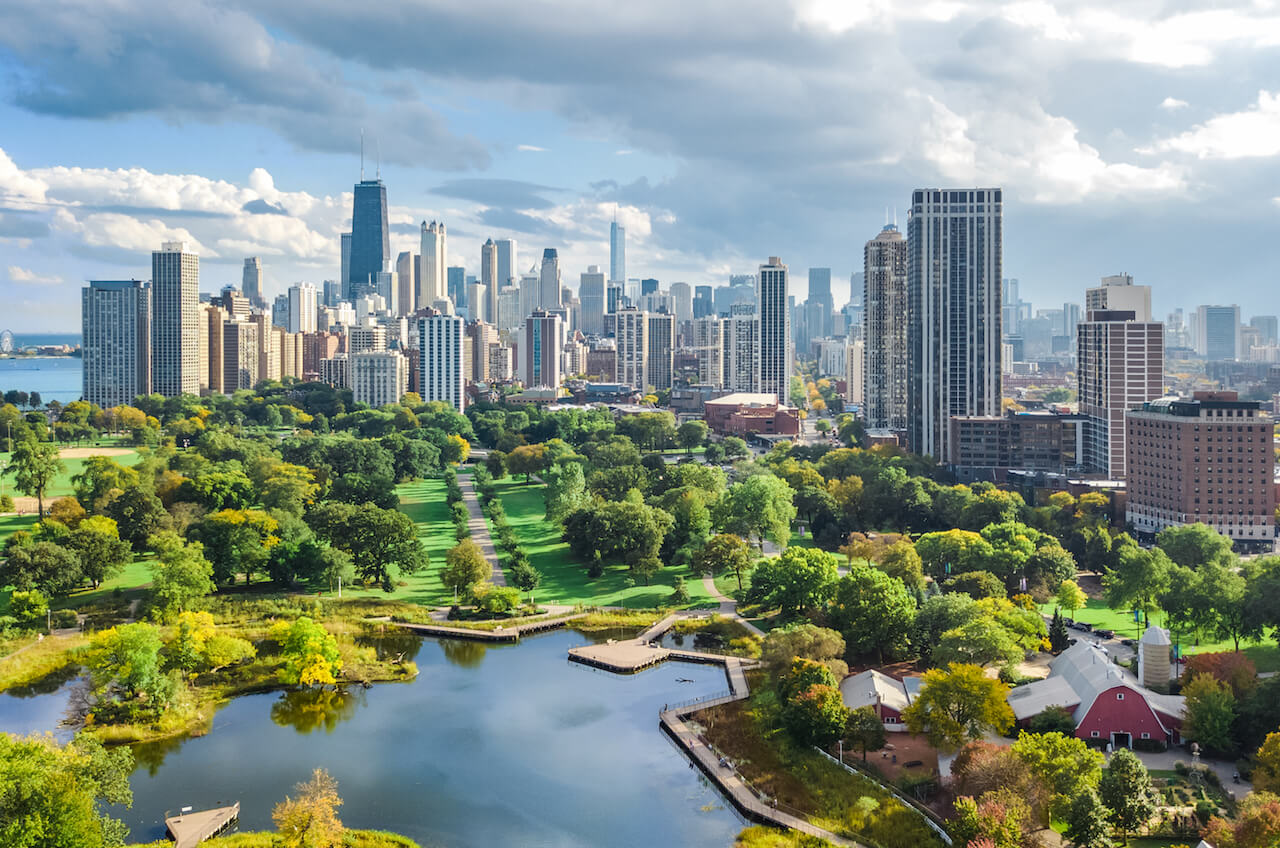Is Illinois The Next US Gambling Mecca?

Like a lighthouse glimmering on the horizon of a pitch-black ocean, you can see the casino lights of Las Vegas luring you to gamble as you fly into McCarran International Airport. Similarly, the newly rejuvenized Atlantic City, fueled with the lifeblood of sports betting, has all its gaming options in a centralized location.
But what if you looked at gambling in an entire state? Would Nevada and New Jersey still be the gold standards?
One could argue Mississippi, with its 26 casinos, can be part of the conversation. But when you dive into how much gambling is concentrated in one state, the answer is relatively simple.
Known more for its political corruption, Michael Jordan, and deep-dish pizza (one of the finest tourist traps in America), Illinois is not a state the general audience associates with gambling. The state does indeed have an abundance of gambling options, but the lack of a centralized hub will never give it the appeal of Las Vegas or Atlantic City.
But when you analyze betting in Illinois as a whol
e, that is an entirely different equation.
In a world where the Professional and Amateur Sports Protection Act (PASPA) has been repealed, online poker is gaining traction, and putting lottery games online are all slowly becoming the norm, Illinois has gradually positioned itself to become the next gambling mecca.
A well-oiled gambling machine exists in the Midwest
History has not been kind to the Land of Lincoln when it comes to gambling. The state has tried and failed to pass a gambling expansion bill for years. But a few months ago, with the help of newly elected governor J.B. Pritzker, a Democrat, lawmakers were able to pass S 690, a bill filled with every form of legal gaming imaginable.
Kent Redfield, professor emeritus of political science at The University of Illinois Springfield said, the big-ticket item for the state will be the licenses to operate sports betting.
“The governor is counting on the $10 million that each license will cost,” Redfield said in an interview with Play USA.
Pritzker is counting on $200 million in licensing fees from legalized sports betting to close a $3.2 billion budget gap, a gap that continues to grow larger and larger by the day.
“In the past, this bill would have been too big,” Redfield said. “But looking at the need for pensions, social services, and capital spending, this becomes part of the puzzle.”
But the puzzle in IL is more prominent than just sports betting.
The state of gaming in Illinois
For a frame of reference, here is the current level of gambling in the state:
- Video gaming terminals (VGT) 32,561
- VGT establishments 7,079 (5 terminals each)
- 10 casinos
- 1,200 gaming positions per casino
- 3 racetracks
- State lottery
- Online lottery games
- Daily fantasy sports
- *Note there is no gambling in Chicago
Here is the amount of gaming that will be integrated into IL, once the gambling expansion bill is fully realized.
- VGT establishments +1 extra machine
- 5 new casinos
- 2,000 gaming positions per casino
- 1 Chicago mega-casino
- 4,000 gaming positions for Chicago casino
- 11,200 total new gaming positions
- 1 new racetrack
- Sports betting
- 16 retail sportsbooks
- 3 online sportsbooks
- 2,500 sports betting lottery kiosks (year one)
- 2,500 sports betting lottery kiosks (year two)
- The ability for horse tracks to have up to 1,200 casino games (slots and table games)
Once every casino is built, every VGT machine is turned on, and every sportsbook is live, the amount of available gambling in Illinois will dwarf that of any state in the US.
Illinois is full of potential, but never Las Vegas
Las Vegas is known for having every vice imaginable. But that isn’t the only reason gambling companies continue to call it home.
“Illinois has a large concentration of gaming if you take into account limited gaming locations. But Illinois may not ever see the level of investment that we see in Las Vegas because of its substantial gaming tax rate,” said Jennifer Roberts, associate director of the UNLV International Center for Gaming Regulation.
Roberts, an adjunct professor at the William S. Boyd School of Law, said Nevada is very business-friendly with its tax structure, and because of this, an expansion of gambling in IL poses no threat.
“Where we may see an impact is if gaming companies traditionally headquartered in Nevada decide to move their corporate offices outside the state,” Roberts said.
With how poorly managed the tax structure in IL currently is, Nevada will not be losing any business to the Midwest, and the casino industry knows that.
In May, Moody’s Investments Services released a report that said IL had the lowest investment rating in the country.
In a statement, Moody’s vice president, Emily Raimes, had this to say:
“While most states have healthy reserves and inherently strong fiscal flexibility, Illinois and New Jersey both have low levels of reserves relative to the potential revenue decline in our recession scenario. In addition, they both show weakness in their pension risk scores.”
Illinois has a staggering $133.5 billion in unfunded state pension liabilities. The hope is that gambling mixed with Pritzker’s $41.5 billion capital plan over the next six years will help bring some relief to the state.
Illinois gambling opposition and tax rates
As thorough as the expansion plans are, there is always opposition. The Illinois Casino Gaming Association (ILCGA) opposed the bill from the start. Tom Swoik, executive director of ILCGA, told ProPublica-Illinois, the gambling bill would not benefit the casino industry.
“This state has not been business-friendly to casinos from the beginning, and this bill doesn’t help that,” Swoik said.
Unlike other states, IL has draped the gaming industry in taxes ever since riverboat gambling appeared in the 1990s.
Currently, casinos are taxed 15 percent AGR up to or including $25 million, according to the Illinois Gaming Control Board (ILGCB). Video gaming is taxed at 30 percent with a four percent increase slated for 2020.
Once it arrives, sports betting will be taxed at 15 percent but the real kicker is the massive 72 percent tax rate for a Chicago casino.
Despite the lopsided tax structure, Cory Aronovitz, a gaming attorney with Casino Law Group, told Play USA, Illinois had positioned itself to lead in two very critical categories.
“The way Illinois approached the gambling bill will put it in a position to maximize revenues, as well as, lead in the integrity aspect of regulation,” Aronovitz said.
According to figures from the ILGCB, the state collected $39,618,042 in gambling taxes in August, while municipalities divided up $7,074,648–all from VGTs.
In August, the state’s 10 casinos generated $117,895,319 in gross gaming revenue. Of that, $38,057,318 went to the state and $6,841,296 to local municipalities.
The numbers appear promising even without sports betting, but are they enough to pull the state out of the financial abyss it calls home and bring new business to
the Midwest?
Can Illinois expect gambling help in the immediate future?
Steve Brubaker, a longtime gambling lobbyist in IL, said the top two earners in the state are VGT companies followed by Rivers Casino.
In August, Rivers generated $37,598,367 in gross gaming revenue, with the next closest being the Grand Victoria in Elgin, IL, which collected $14,484,111.
But according to Brubaker, don’t expect the floodgates to burst wide open with gambling and tax dollars.
“Those who think we are going to have all this gaming in the first year or two haven’t been paying attention to the history of Illinois,” Brubaker said.
However, Aronovitz speculates the state gaming board might move rather quickly with some aspects of the gaming bill. In terms of VGT’s, Aronovits fully expects a rollout of new gaming machines to occur later this fall.
“I predict there will be sports betting by the start of the 2020 football season,” Aronovits said. “Issuance of new casino licenses by late October 2020 with the anticipation of a Chicago casino by Q3 or Q4 of 2021.”
But first, a few things must be fixed by the gaming board, and on September 17, the ILGCB took steps to clean things up.
The five-member board passed a resolution that would change the state law making casinos more viable. Although a step in the right direction, newly appointed chairman Charles Schmadeke told the Chicago Tribune, the role of the gaming board is not to tell lawmakers what to do.
“Our role is merely to refer to the legislature for consideration, and it’s up to them to do as they deem appropriate,” Schmadeke said.
Legal Illinois gambling and what could be…
Perhaps it’s foolish to think Illinois could ever become a lighthouse off in the distance–a beacon of gambling delight where sports bettors, daily fantasy sports enthusiast, and casino fiends come to indulge in all the pleasure the state has to offer.
Illinois is poised to see gambling growth for the next several years. Lawmakers are planning to correct some of the mistakes in S 690 when they return for a veto session in October. All legislative sponsors of the gambling bill could not be reached for comment.
“This is a long term commitment by the state,” Aronovitz said. “The realization of tax revenue will need to be revisited after the initial rollout of full gaming under the act.”
But the path to a gambling mecca, even if only in the Midwest, has already been put into motion.
Two of the state’s racetracks have already submitted applications to operate casino games. One way or another, Chicago will get its long sought-after casino. Sports betting will finally arrive with glorious applause, more VGT’s will pop up, and additional casinos will be constructed.
Illinois is hoping gambling can help pull itself out of debt. But in the end, everyone knows the house always wins.










